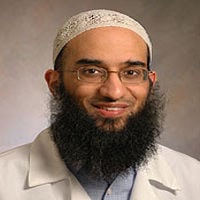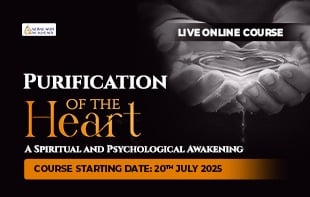(Professor of Pathology, Pritzker School of Medicine, University of Chicago, USA)
Shaykh Husain Abdul Sattar
Shaykh Husain's life journey is a fascinating blend of rigorous academic pursuits and deep spiritual engagement, reflecting a profound commitment to both science and faith. Born in 1972 in Chicago, Illinois, Shaykh Husain embarked on a path that seamlessly wove together the threads of secular and religious education, leading him to become a prominent figure in both fields.
Early Life and Education
Shaykh Husain's early life in Chicago laid the foundation for his dual pursuits in science and Islamic studies. After completing his primary education, he joined the prestigious University of Chicago as an undergraduate. Here, his academic interests were diverse and ambitious, he majored in Biology, Arabic, and Islamic Civilization. This multidisciplinary approach not only provided him with a robust scientific foundation but also deepened his understanding of Islamic culture and languages. During his undergraduate years, Shaykh Husain began studying sacred knowledge in earnest.
Shaykh Husain immersed himself in the study of Arabic grammar (nahw), Hanafi jurisprudence (fiqh), and the principles of jurisprudence (usul al-fiqh) under the tutelage of local scholars (‘ulama) in Chicago. This period marked the beginning of his lifelong engagement with Islamic scholarship.
In 1994, Shaykh Husain commenced his training in Islamic spirituality, known as tasawwuf. Tasawwuf, often referred to as Sufism in the West, is the inner, mystical dimension of Islam. It focuses on the purification of the heart and soul, aiming to develop a closer, more personal relationship with the Divine. This spiritual training complemented his formal studies, fostering a holistic approach to knowledge that integrated both the mind and the heart.
Medical Education and Further Religious Studies
After obtaining his undergraduate degree, Shaykh Husain enrolled in the Pritzker School of Medicine at the University of Chicago. The rigors of medical school did not deter him from his pursuit of sacred knowledge, instead, he managed to balance his medical studies with his religious education. This dual commitment reached a pivotal point in his final year of medical school when he decided to take a leave of absence to focus entirely on his religious studies.
Shaykh Husain's quest for knowledge took him to Syria and Pakistan, regions renowned for their rich Islamic scholarly traditions. In these countries, he immersed himself in a traditional curriculum under the guidance of some of the most esteemed scholars of the time. This period of intense study and spiritual training was transformative. In July 2001, after years of dedicated study and practice, he was formally authorized to teach tasawwuf. This authorization, known as ijazah, is a significant milestone, signifying a scholar's readiness to teach and guide others in the spiritual sciences.
Professional Career in Medicine
Today, Shaykh Husain is a respected Professor of Pathology at the University of Chicago’s Pritzker School of Medicine and a practicing Surgical Pathologist at the University of Chicago Medical Center. His contributions to medical education are widely recognized, particularly through his textbook “Fundamentals of Pathology” and his educational website, Pathoma.com.
“Fundamentals of Pathology” is one of the most popular medical textbooks worldwide, lauded for its clarity, comprehensiveness, and practical approach to understanding pathology. Pathoma.com, used by medical students globally, provides accessible, high-quality educational resources that complement traditional medical training.
Shaykh Husain's ability to excel in both medical and religious fields is a testament to his intellectual versatility and dedication. His medical career, marked by a commitment to education and excellence in pathology, runs parallel to his role as a scholar of Islamic spirituality and law. This unique combination of expertise allows him to bridge the gap between science and spirituality, offering a holistic perspective that is rare and invaluable.
Contributions to Islamic Education and Spirituality
Outside of his professional medical career, Shaykh Husain is deeply involved in Islamic education and spiritual guidance. Residing in Chicago with his wife and children, he dedicates his free time to teaching and lecturing on various subjects of Islamic knowledge. His lectures often emphasize the importance of purification of the soul, reflecting his deep engagement with tasawwuf.
Shaykh Husain's approach to Islamic education is both traditional and contemporary. He respects and upholds the classical methods of Islamic scholarship, while also addressing the challenges and questions of the modern world. This dual approach makes his teachings accessible and relevant to a wide audience, particularly to those who, like him, navigate the demands of modern professional life while seeking to maintain a strong spiritual foundation.
Integrating Science and Faith
One of the most remarkable aspects of Shaykh Husain's life is his ability to integrate science and faith seamlessly. In a world where these two domains are often seen as conflicting, his life and work serve as a powerful reminder of their potential harmony. His academic and professional achievements in medicine do not detract from his spiritual pursuits; instead, they complement and enhance each other.
Shaykh Husain's medical expertise informs his understanding of the human body and health, which in turn enriches his spiritual teachings on the importance of caring for the body as a trust from the Divine. Conversely, his deep spiritual insights provide a profound ethical framework for his medical practice, emphasizing compassion, humility, and the sanctity of life.
Impact and Legacy
Shaykh Husain's impact extends beyond his immediate circles of students and colleagues. Through his books, website, lectures, and personal example, he has influenced countless individuals worldwide. His ability to inspire and guide others in both their professional and spiritual lives is a significant part of his legacy.
His textbook “Fundamentals of Pathology” has become a staple in medical education, helping thousands of medical students master the complexities of pathology. Pathoma.com has further expanded his reach, providing a valuable resource for students and professionals seeking to deepen their understanding of pathology.
In the realm of Islamic education, Shaykh Husain's teachings on tasawwuf and Islamic jurisprudence have resonated with many, offering a path to spiritual growth that is grounded in traditional scholarship yet responsive to contemporary needs. His emphasis on the purification of the soul addresses a fundamental aspect of human experience, providing guidance for those seeking to navigate the moral and spiritual challenges of modern life.
Conclusion
Shaykh Husain's life is a testament to the harmonious coexistence of science and spirituality. His journey from a young student in Chicago to a renowned scholar and medical professional demonstrates the power of dedication, balance, and a holistic approach to knowledge. By excelling in both his medical career and his religious studies, he has shown that the pursuit of scientific and spiritual knowledge can be mutually enriching, each providing valuable insights and perspectives that enhance the other.
As a Professor of Pathology, a practicing Surgical Pathologist, and a respected Islamic scholar, Shaykh Husain continues to inspire and guide others. His contributions to medical education and Islamic spirituality are profound, reflecting a life devoted to the pursuit of knowledge, the service of humanity, and the quest for spiritual excellence. His legacy serves as a beacon for future generations, illustrating the potential for a life that integrates professional success with deep spiritual fulfillment.


